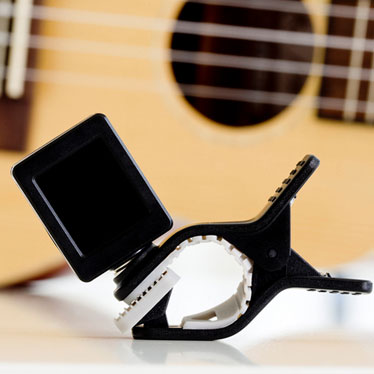High Tech Gadgets For Tuning Your String Instrument

The world has radically changed in the last 50 years. Technological advancements have transformed the way almost everything works, from smart cars and phones, to cloud connected home appliances and 3D printers. This state-of-the-art revolution is so prevalent that even the most basic devices have become hi-tech, including your string instrument tuner.
Electronic tuners have been around for a while. In fact, during the 1980’s, they saturated the market, and musicians of all styles embraced the mobility, accuracy, and ease they offered. However, before then, the most common methods of gauging the right pitch involved either a tuning fork or pitch pipe. A pitch pipe delivers the correct pitch when you blow on a brass reed enclosed in the pipe, while the tuning fork produces the vibration frequency when struck. Both of these pitch-defining devices created a single pitch (A440), and then each additional string was tuned accordingly—not the easiest method for beginners.
The electronic tuners that were developed approximately 40 years ago typically featured a mechanical needle that registered on a dial somewhat like a voltage meter. They had a built in latency in order to stabilize the needle, so that it wouldn’t jump around wildly from unsteady sounds. However, the digital age altered their construction, offering a LED display rather than a mechanical needle, and the ability to make them smaller. Many of the most popular hi-tech tuners today can be attached to the neck of the instrument, registering the frequency vibrations with extreme precision.
String Tuning Terminology
Although you can purchase a digital tuner for your specific instrument, it will only register the pitch of each string. For example, a dedicated guitar tuner will register E, A, D, G, B, E, or a violin tuner will measure the E, A, D, and G string. However, chromatic tuners register any specific note, including semitones. The advantage of a chromatic tuner for unfretted instruments is invaluable for student musicians. A few of the terms used with string tuning include:
- Calibration—this allows you to slightly modify the pitch to match other instruments or music (some popular songs are written this way to fortify artistic license)
- Quartz—this is the electronic technology used to register accurate frequency waves
- Reference note—this is a sustained pitch that delivers a reference point for string tuning
Hi Tech Turners for Today’s Musicians
The market for digital tuners is larger than ever, and there are tons of new ones available for purchase. These hi tech tuners will transform your string tuning method, making it easier and faster.
Korg Digital Chromatic Tuner (CA 1)
This excellent string tuning device offers tons of features and is highly rated by users. It is compact, to easily fit in your instrument case and includes a LCD needle-style gauge for the VU meter. It sports a wide tuning range, C1 (32.70 Hz)-C8 (4186.01 Hz), and has a tilt feature that allows you to easily prop it by using a regular plastic card. It also includes pure major and minor chord marking, adjustable calibration, and extended battery life. Find it online or at your local dealer for around $25.
Korg Digital Chromatic Tuner (CA-40)
Very similar to the CA 1 model, this tuner detects pitches in the range of A0 (27.50 Hz)-C8 (4186.01Hz), and includes a built in stand for easy use. You can also purchase the additional input jack that allows string tuning without interference form background noise. Plus, its output jack allows you to monitor your pitch while you are playing. It costs around $20-$25.
Cherub Digital Chromatic Tuner with Key Transposition (WST-520C)
This tuner includes four key transposition and very fast response. The easy to read display and built-in mic and input jack make this a very affordable, accurate hi tech tuner for any musician. The range is A1 (55 Hz) - A6 (1760 Hz), and you can get this device for under $20.
AxeRig Clip-On Chromatic Guitar Tuner
This chromatic tuner is the clip-on variety, which allows hands-free operation. Because it registers the vibrations form your instrument, the accuracy is excellent. It is very durable and the display pad rotates so that you won’t have to squint to see the read out. For $19, this is an affordable, lasting tuner.
Snark SN-5 Tuner for Guitar, Bass and Violin (Old Model)
You simply can’t beat this chromatic tuner for less than $10. Snark is a leader in clip-on tuners and this model is a prime favorite with a number of musicians for its ease of use and accuracy. The secure clamp won’t damage your instrument and fits easily in any instrument case.
Thanks to technology, these hi tech tuners will change the way you tune your instrument, transforming what is typically a chore into a more accurate, quick, and simple technique.


